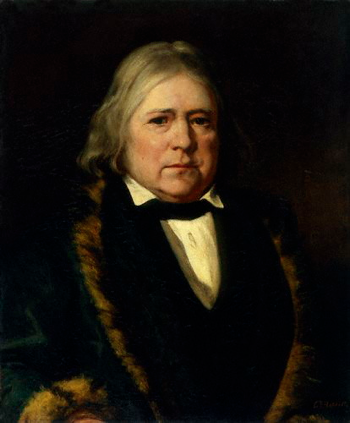Sunday - March 18, 2012
Protectionist Hypocrisy

Today I came across this great speech by William Johnson Fox (1786-1864) who was one of the leading figures in the Anti-Corn Law League. He gave it at the Covent Garden Theatre on January 25, 1844, and it is a devastating attack on the hypocrisy of those members of the elite who want to prevent the masses from enjoying the same benefits of international trade as they do. I especially like the spreading of guano bit at the beginning.
... It is a favourite theme, this independence of foreigners. One would imagine that the patriotism of the landlord’s breast must be most intense. Yet he seems to forget that he is employing guano to manure his fields; that he is spreading a foreign surface over his English soil, through which every atom of corn is to grow; becoming thereby polluted with the dependence upon foreigners which he professes to abjure.
To what is he left, this disclaimer against foreigners and advocate of dependence upon home? Trace him through his career. This was very admirably done by an honourable gentleman, who just now addressed you, at the Salisbury contest. His opponent urged this plea, and Mr. Bouverie stripped him, as it were, from head to foot, that he had not an article of dress upon him which did not render him in some degree dependent upon foreigners. We will pursue this subject, and trace his whole life. What is the career of the man whose possessions are in braod acres? Why, a French cook dresses his dinner for him, and a Swiss valet dresses him for dinner; he hands down his lady, decked with pearls that never grew in the shell of a British oyster; and her waving plume of ostrich-feathers certainly never formed the tail of a barn-door fowl. The viands of his table are from all the countries of the world; his wines are from the banks of the Rhone and the Rhone. In his conservatory, he regales his sight with the blossoms of South-American flowers. In his smoking room, he gratifies his scent with the weed of North America. His favourite horse is of Arabian blood; his pet dog of the St. Bernard’s breed. His gallery is rich with pictures from the Flemish school, and his statues from Greece. For his amusements, he goes to hear Italian singers warble German music, followed by a French ballet. If he rises to judicial honours, the ermine which decorates his shoulders is a production that was never before on the back of a British beast. His very mind is not English in its attainments; it is a mere pic-nic of foreign contributions. His poems and philosophy are fro Greece and Rome; his geometry is from Alexandria; his arithmetic is from Arabia; and his religion from Palestine. In his cradle, in his infancy, he rubbed his gums with coral from Oriental oceans; and when he dies, his monument will be sculptured in marble from the quarries of Carrara.
And yet this is the man who says: “Oh! let us be independent of foreigners! Let us submit to taxation; let there be privation and want; let there be struggles and disappointments; let there be starvation itself; only let us be independent of foreigners!” I quarrel not with him for enjoying the luxuries of other lands, the results of arts which make it life to live. I wish that not only he and his order may have all the good that any climate or region can bear for them - it is their right, if they have wherewithal to exchange for it; what I complain of is, the sophistry, the hypocrisy, and the iniquity of talking of independence of foreigners in the article of food, while there is dependence in all these materials of daily enjoyment and recreation. Food is the article the foreigner most wants to sell; food is that which thousands of our operatives most want to buy; and it is not for him - the mere creature of foreign agency from head to foot - to interpose and say: “You shall be independent; I alone will be the very essence and quintessence of dependence.” We compromise not this question with parties such as these; no, nor with the legislature.
Memorial Edition of Collected Works of W.J. Fox. Vol. IV. Anti-Corn-Law Speeches, chiefly reprinted from the "League" Newspaper; and Occasional Speeches (London: Charles Fox, Trübner & Co., 1866), pp. 62-63.
